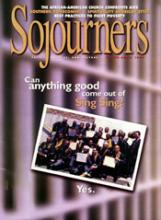Barbara Kingsolver is a high-energy novelist, at once funny and serious. The Bean Trees, Animal Dreams, and Pigs in Heaven all engage characters seriously with a real world beyond their own sensibilities and domestic affairs. Her spirited book of essays, High Tide in Tucson, combines the experience of parenting, her biological training, and observations about social policy. These essays presage but do not predict The Poisonwood Bible, a big, dark, comic novel in which an American family is both instance and agent of imperialism. In my judgment, Kingsolver here joins the ranks of such storytellers as George Eliot, Tolstoy, and Dickens, for whom political power, resistance, and change are essential to plot, rather than mere scenery behind it.
Nathan Price, a Baptist missionary and a damaged survivor of war's carnage, takes his family to the Congo in 1959 to bring souls to Christ. The five females in his command tell the tale. The mother, Orleanna, reflects retrospectively. The daughters, ranging from 14 to 4Rachael, Leah, Adah, and Ruth Maynarrate their experience, each in her own distinctive voice. Teen-age Rachael is self-absorbed and hilariously given to malapropism. Leah, her father's acolyte, is eager to learn what is around her. Her physically handicapped twin, Adah, retreats into sardonic brooding, and little Ruth May struggles to understand, reaches out to make friends, and sticks her bad-tasting malaria pills on the wall behind her bed. From Mississippi and Georgia, the Prices bring with them not only what they imagine they will needtools and garden seeds, pinking shears and Betty Crocker cake mixesbut habits of racial superiority. God has sent them to take up the White Man's Burden, to save the village of Kilanga and its people.
Read the Full Article
